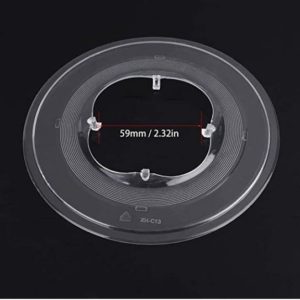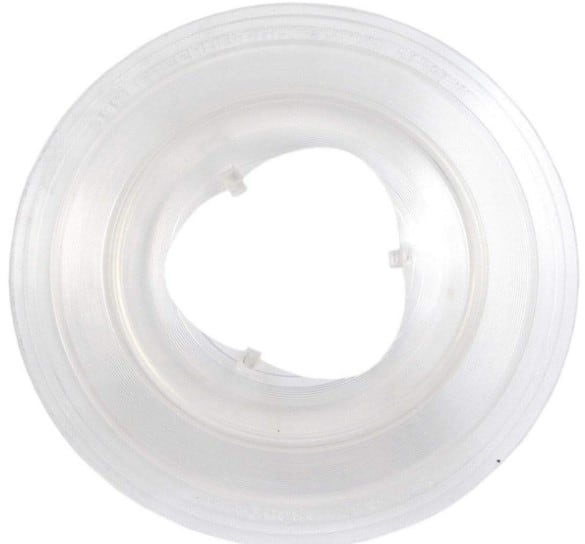When you buy a new bicycle, you might find a disc (mostly plastic) between the largest cog and the rear wheel spokes. That’s the spoke protector! You will mostly find them on entry-level bikes. That’s why most beginners ask, “Is a spoke protector necessary?”
A spoke protector is necessary because it prevents the chain from digging into the spoke in case it falls between the spokes and the big gear cog. Also, in an accident involving the rear mech, the spoke guard acts as a barrier between the chain and the spokes.
All the same, the need for a spoke protector fades away when you adjust your bike’s rear derailleur appropriately.
Notably, some people remove the spoke guards the moment they get home with their bikes. So, is a spoke guard necessary?

What Does a Spoke Protector Do – Is a Spoke Protector Necessary
As mentioned in the introduction, the work of the spoke protector is mainly to prevent the chain from reaching the spokes. Mostly, if the derailleur is not well set, it pulls the chain laterally. When the misalignment is significant, it could lead to the chain dropping.
Technically, the misalignment could lead to involuntary gear shifting, which is known as gear slipping.
In such a situation, shifting your gears to the smallest cog drops the chain between the cassettes/freewheels, and the chain stay and it gets stuck. On the other hand, shifting gears to the largest cog may drop the chain between the spokes and the cog.
Consequently, due to the coasting hub, the chain may greatly damage the spokes. That’s where a spoke protector becomes every rider’s darling.
If you wish to install a spoke guard, you may look at the SUNLITE Cassette Spoke Protector which is made of clear plastic and only weighs 4 ounces.
If you have a spoke protector on, it will keep the chain away from the spokes. Therefore, even if the bike coasts for some distance after a chain drop, you will most likely not lose a spoke.
Other Scenarios that Could Make the Chain Drop
Even when you have set the derailleur perfectly, other situations could make the chain drop unexpectedly. Actually, it is such eventualities that make a spoke guard valuable to a cyclist. Other than a poorly adjusted derailleur, your chain may suddenly fall due to:
A Sudden Jump or Touchdown
When you are riding on a low gear, a sudden jump or a touchdown could lead to a chain drop. Technically, the chain bounces when the bike jumps and when it comes down.
The bounce could be big enough for the chain to go off the cog. You never want this to happen when you don’t have the spoke guard on.
So, getting one of them like the Dioche Bicycle Flywheel Guard will save you lots of pain, especially if you are an off-road rider. Notably, it is also ideal for bikes with disc brakes.

Knocks From External Objects to the Derailleur
At times, things happen so fast that we can’t dodge them. For example, an external object on the terrain, such as a branch or any other obstacle, may hit the derailleur. When this happens, the derailleur hanger may bend and cause a gear slip.
A spoke protector could be of great help in such a scenario as it would keep the chain from reaching the spokes.
To minimize chances of your derailleur getting knocked out of line, install a spoke guard. Just one guard like the Keenso Freewheel Spoke Protector can save you the pain of carrying your broken bike home. Consequently, don’t forget the cost you have to bear while repairing the bike.
Does a Spoke Guard Have Other Benefits?
The main reason bikes have a spoke guard is to keep the chain from getting into the spokes. All the same, it comes with a few additional benefits.
For example, one of these benefits is that a spoke protector reduces contamination of the brake rotor and the brake pads by dirt from the chain and the cassette,
When brake pads are dirtied, they lose their efficiency, and they also make a lot of squeaky noises. These noises are irritating, and brakes with compromised efficiency can be catastrophic.
Do You Need a Spoke Protector – Which is the Best One?
From what we’ve seen so far, a spoke protector is a small piece of equipment that most riders may not notice until they experience a chain drop.
Again, you won’t find a spoke guard on high-end bikes. So, do you need a spoke protector? If yes, which is the best?
Going by what we discussed earlier in the post, it is evident the spoke guard plays a vital role in your bike. Therefore, the answer here is, yes, you need a spoke protector on your bike.
Mostly, if you are the kind that takes off-road rides often and uses the low gear a lot, you need to have the guard on.
There are excellent protectors that you can purchase with a few bucks. For example, the Shimano Bicycle Chain/Spoke Protector is light in weight (1.6 ounces) since it is made of resin.

Also, you can go for the black SM SunniMix 4 Piece bike spoke protector that comes as a pack of four for the price of one.
Having the spoke guard on or not is solely a personal choice. All the same, before you go removing the protector, make sure you properly adjust your drive train.
Notably, those cyclists who go without spoke protectors do so by choice. But before you join them, you need to weigh the risks against the cost of a spoke guard.
Should I Remove My Spoke Guard?
From a technical point of view, you shouldn’t remove the spoke protector. Furthermore, an accident can make a perfectly indexed derailleur drop the chain in. If that were ever to happen and find you without a spoke guard, the chain would completely destroy your wheel.
Again, the spoke protector has other benefits like keeping the brake rotor and brake pads clean. In fact, when you find yourself asking about removing an accessory from the manufacturer, you better leave it on.
All the same, the ball is on your side. If you want to take the risk, make sure your derailleur limit screws are correctly adjusted.
Also read:
Final Word
So, is a spoke protector necessary? I believe we all know the answer is yes. For riders who like going off-road, a spoke guard can prove to be vital.
When the ground is uneven, the chain may drop during a jump or a touchdown. Equally, if an external object hits the derailleur, it may drop the chain between the big cog and the spokes. This would be disastrous, especially if you were coasting and you didn’t have a dork disk.
Since accidents do happen without notice, it is better to leave the guard in place. It may take time before you see the spoke protector at work, but when time comes, you will be glad you had it on.
Frequently Asked Questions
Is a dork disc necessary?
Generally, for bikes that are equipped with mid-range to top-tier components, the need for a dork disc, also known as a spoke protector, may not be as pronounced. This is mainly because a high-quality rear derailleur, especially when properly set with the limit screw, is designed to prevent the chain from jumping off the back of the cassette. Therefore, in such cases, a dork disc may not be necessary to prevent damage to the spokes. However, if you frequently ride in harsh conditions or if your bike’s derailleur adjustment isn’t perfect, having a dork disc can offer an extra layer of protection. So, while not universally necessary, a dork disc can provide a useful safeguard under certain circumstances.
What is the plastic thing behind cassette?
The plastic piece located behind a bike’s cassette is known as a Spoke Protector. As the name implies, its primary function is to shield the spokes from any potential damage – especially from the derailleur or chain inadvertently getting tangled in them. This is important because a mishap of this nature could result in significant and costly damage to the wheel, derailleur, and even the bike’s frame. The Spoke Protector, typically made of plastic or sheet-metal, fits snugly between the bike’s cluster and the right-side spokes on the rear wheel, thus acting as a protective barrier in the event of a mechanical slip. In my many years of biking, I’ve seen a fair share of accidents that could have been avoided with this simple device. So, the plastic thing behind the cassette is a Spoke Protector, an important safeguard that can prevent costly damage to your bike.
How do you remove a dork disc?
Removing a dork disc can be easier than you might think. First, you’ll need to remove your rear wheel and the cassette. Depending on the design of the disc, you may be able to simply unclip it from the spokes or hub. In some instances, however, the disc may be more securely fastened, requiring you to cut it off carefully. Remember, safety should always be your primary concern when working on your bike. It’s worth noting, though, that while some consider the disc an eyesore, it does serve a useful purpose. From my years of experience maintaining bikes, I’ve started to appreciate these little protective measures. If you’re sure about your decision, go ahead, but always proceed with care and satisfy the necessary safety checks when removing a dork disc.
Are bike spokes important?
The importance of bike spokes can’t be overstated. These rod-like components connect the bicycle hub to the rim, and essentially serve as the transfer points for all loads between the two. Whether it is the weight of the rider or the bike itself, all the related forces pass through the spokes. These forces can be quite significant especially when navigating rough terrain or executing certain maneuvers. Hence, having strong and well-maintained spokes is crucial for the stability and performance of your bike. During my time as a bike mechanic, I’ve seen numerous instances where neglecting to maintain or replace faulty spokes has led to avoidable accidents and damage to the wheel. So, to answer your question, yes, bike spokes are enormously important for the mechanical integrity and overall performance of your bicycle.